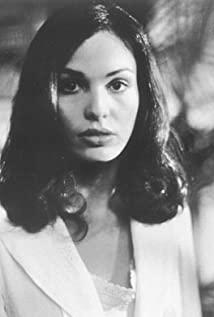end of September, the night in the plains came very lightly, and the day ended when the headlights of the car turned on inadvertently. The setting sun cast a magical light on the brick wall. It was a very abstract moment for the city, and it was a time for women to travel. Women in many cities in Baogu are an ethnic group in the real world. Men wait till dusk to see them. These men are very fond of money, but also very cunning and lazy, with a dull pace. If money disturbed them, women soothed them. In Treasure Valley, men love women with sarcasm. At sunset, they watched them go by, and the women knew it. At night, you see groups of men chatting on the sidewalk. They talk about women, or money.
The film I wanted to make was about the strange adventures of a man and a woman in Ferrara. Only people who were not born and raised in the city would find it strange. Only the residents of Ferrara can understand a relationship that lasted 11 years and never existed.
The original conception of the film is different from what I'm going to say now. It was suggested by a friend while chatting on a street corner all night. It was a famous street corner, where the Avenues of Chavananrolla and the Avenues of Presolo meet. Above our heads there is a commemorative inscription: "Here the most eminent poet and linguist, Ecole di Tito Strozzi, was attacked in the night and fell to the ground. 1508." This is another story.
In the friend's story, the protagonist is a young man who loves a girl, but the girl does not return his love. It's not that she doesn't like the young man, it's the exact opposite. Intuition tells her to say no. However, the young man continued to pursue her, stubbornly pursuing her for several years. Everyone in town knew that they followed the progress of the man and woman, talking about them from time to time. But the girl insisted on rejecting him. Until one day the weather was fine and she surrendered. The young man takes her to his bachelor pad and undresses her, which she makes him do. She became tame and gentle. He was ready to have her. Just as he was about to do it, she backed away and said to him,
"I beat you."
She got dressed and left without saying a word.
The intensified sarcasm was destined to be a big hit in the chronicle of Ferrara's love affair. From this sentence, the story of these two strange lovers really begins.
Except for a casual encounter on the street, the two have never met. But to everyone, she is still his girl and he is her man. Both had other adventures, other lovers, but neither was married. All in all, or to put it bluntly, the two reciprocate each other with abstract loyalty. I'm sure it's been that way for the rest of their lives.
I happened to come across Gilsepe Raimondi's book, The Chronicles of Emilia, and I noticed a story in it that was very similar to that affair. Because of this, my professional habits led me to come up with a third story that combines the best of both worlds. I wrote the story down and borrowed some of Raimondi's words. Literature is forbidden to do so, but movies are not. Because in the script, if the words are not used for dialogue, but to describe inner situations or images, they are not counted, they are only temporarily used to record things that need to be known when making a movie.
This was the first time I allowed myself to accept the temptations of the past. The screen is always playing with history. There are directors who have succeeded in making their vision of history believable. They are Eisenstein and Akira Kurosawa, Tarkovsky in Andrei Rublev, or Mag Stroop in Darlene Bach, Rossellini in The Seal of Power of Louis XIV, or Kubrick in 2001: A Space Odyssey. However, this recent incident, memories are within reach. On top of that, I was quite fascinated by the idea of treating Ferrara in terms of fantasy chronology, in which events from one period had to be mixed with another. Because for me, this is Ferrara.
It was almost five o'clock when Silvano walked into the cinema. It was an old theatre, with green painted walls and an old gleaming sheen reminiscent of the patina of bronze. The film shown is a story of love and politics. Love or not, Sivano loves political movies. He has already watched The Generation of Traitors twice. When the first reel was finished, the lights were on. Everyone was looking, and so was Silvano. Curious and defiant glances alternated. One of those glances uplifted Silvano and inspired him to look back. That mischievous look hinted at a call to him during the deadly intermission. The eyes came from a face whose age was not disclosed, more than 30 years old! The woman looked at her and let herself be looked at by others, as if asking: Don't you remember?
Silvano remembered confusedly. At that time everything went according to his will, even the face, which he could not locate. But when the room returned to darkness again, a strong emotion flooded his heart. At the end of an old year followed by a brand new year, 11 years. Suddenly, the vague neoclassical silhouette of the Ferrara girl returned to his eyes.
One November morning, a small train crossed the plains toward Shan Butterfly, and the sea in those areas turned ugly. Poor sun, those workers are waiting for it, and when it comes up they can lengthen the gutter. A train station, a taxi, a muddy road. On the road, a girl walked towards him with a bicycle. Silvano stopped the car to avoid splashing mud, and the girl turned her head to thank him, her voice slow and serious.
The young man stayed in the town tavern, which was now a place to eat, and saw the girl there when he came down to eat. Some tables have tablecloths, some do not, and workers sit next to the latter. They ate and drank pumpkin seeds while playing cards. Silvano approached the girl and they started talking. Then they sat in silence for a long time, after which they went out together. Even the moon was helping Silvano, the white moon emitting haze like an opaque window. The two young men started talking again. He said something about himself, and she told him about her teaching career and her impoverished childhood. Her name is Carmen and she is 24 years old. There was some sentimentality in their words, but not much. It's nice to shake hands on a hot, humid night and take someone seriously. The water of Shan Lagoon is the color of iron. He heard a gunshot, which meant the fish thief had been spotted and was being pursued.
The two young men kissed very naturally and resumed their conversation. He had never met a man with whom he could talk so naturally and frankly, and he had never imagined it could be a woman. And she actually had so much to say to a man. People here don't talk much. In fact, when they got back to the hotel, she was also placed in a room, and they were silent, as if they had said everything. On the stairs, he wanted to say a few joking words to dispel the developing romance, or to prove his patience, which was also a sign of love. When he asked where the girl's room was, she answered frankly, the last one on the right. Then she walked away, tightening the belt of her coat, a gesture that made her slimmer and more humble and somewhat submissive. She turned around in front of the door as if to say: I'll wait for you. Silvano smiled at her from a distance.
Then he entered the room, happy and peaceful. He washed his face with cold water and started to undress, thinking nothing. Even he didn't know why the girl gave him such a strong male satisfaction, or his current mood was greatly affected by her. He opened the door several times and went out, trying to go to the girl's room, and then closed the door again and again, thinking that it was too fast, it was only fair to give her time, and it was not manly enough to be impatient. His actions have history to justify it. We have to remember that the city where he was born has completely lost willpower, the control of centuries, the control of the Church.
Silvano lay in bed and fell asleep. The night passed lightly. The next morning he got up and went downstairs to the lobby. They told him that the young lady was still asleep. Silvano thought of flowers, but swamps don't grow flowers. When he saw a plate of pears on the sideboard, he told the manager to ask him to give the plate of pears to the young lady, with a note from him.
At that time, Ferrara had a mysterious and charming temperament, mixed with a casual and aristocratic atmosphere, and dedicated herself to the local residents, and it was limited to them. Farmers gather every Monday in the church square to do business. A dynamic three-way handshake ends the bargain. The third hand is the middleman. They disappeared all week afterward, leaving behind ambiguity and rattling words and old lawsuits floating around, fattening up lawyers. Lawyers are overworked. People respect them and fear them. One was a local newspaper drama critic, and he and several other professionals were always on the county magistrate's invite list. At that time, the county magistrate was regarded as the first citizen, and dances were often held in the palace. It is a grace to be invited. Every year the Knights of Florence host horse races, the last day of which is the Arabian horseback. Those Arabs were from Libya, then an Italian colony. They wore white turbans and clothes, rode little white horses, and wielded crescent-shaped machetes in the rolling yellow sand. There is also a military parade, because it is a charity performance, and nobles also come to participate. Near dusk, lower-class girls leave the factory on bicycles, their skirts fluttering in the wind. There are many girls who are beautiful because they are happy and happy because they are going to meet their boyfriends on the old city walls or in the ramie fields behind them. Green ramie flowers raise the pollen of spring love and fall in the city, making people dazed. Even the fascists are dazed and immersed in all kinds of filthy and filthy local wine, vaguely the temperament of Fangdeism.
I wanted to delve into this subject, but at the time my producers were at odds with me. They especially enjoy the young middle-class playing tennis, wandering through the city's sophisticated treasure hunts, taking motorboats along the Po, or Bianca in the middle of the river opposite Pondlago Guro, which is both exotic and spring-like. Island weekend. At that time, the river was open and the island was out of the water, like a jungle in the Amazon.
It was during this period that fascism showed a tendency to normalize, favoring modest reforms, such as white telephones in movies, popular dance halls were springing up, commerce was booming, but artists were out of stock. A painter by the name of de Vencez spent considerable energy painting landscapes of the city and its surroundings, which attracted the interest of a minority of intellectuals, shrouded in a Gauguin-esque blue sky and dotted with blossoming flowers. polenta. Those polenta are clouds. Few people go to see his exhibitions. Art was a thing of the past in Ferrara back then.
When Sivano looked enviously at the young man of his age walking by with a tennis racket, he also felt a sense of distance, which made him immediately forget about them. And he's in love with a girl he rarely sees. He fell in love at once with the girl he had never had, out of stupid pride, cursed prudence, simple lack of will, or out of stupidity—the quiet stupidity of his city. He heard people talk about the girl. It's a small provincial town, and news about Carmen attracts Silvano like a magnet, and vice versa. Tenderness, anxiety, jealousy, distress—all kinds of adventures that signify a man and a woman sharing life, but the two lovers deal with each other entirely.
But gradually, according to the laws of time and distance, the tension that held them together loosened. For example, Silvano moved to another city, Adeya, while Carmen let the school inspector move her from one village to another. She had a child who died at the age of two.
The lights are on in the theater, and the movie is over. Everyone left in a hurry. Sivano waited for the woman at the entrance, and when he saw her, he stepped forward to meet her. No need to say much. Seems like they just broke up a few days ago. There is no implied past. A sudden surge of urgency gripped them at this very moment. They went to her place at once. A ramshackle house with poplar trees in front and coffee tables under the poplars. Inside is a man's house. It's too much like a man's house, if it wasn't for the fear of seeing jealousy, Sylvano would immediately talk to each other. So he restricts himself to looking at Carmen. This woman dresses more elegantly, which makes him unhappy. He always liked faded and worn suits, the kind that didn't embellish or detract from the body. The suit Carmen was wearing clung to her curves, accentuating a certain tiredness in her face.
The greenness of the poplar poured in from the window, with a dampness. Silvano and Carmen were both hungry and she made something. While they were eating, the wind picked up. The conversation among the poplars began. But they were both silent. Perhaps he understands that once the chatterbox is opened, their topics, their problems, will bear unbearable weight and different feelings: remorse, resignation, disappointment, regret, anger, will replace the sweetness they are indulging in now. They feel like indulging in sweetness is like sinking into a goblet. Carmen told him that she had just received a letter from her ex-lover. Her eyes were wet. She looked at Sylvano as if to say you weren't like that or you've never been like that. She gave him her hand, let him hold it, and laughed, maybe laughing at herself or at their hands across the egg ham.
The truth is that their stories connect so many meaningless days that, whether they realize it or not, are with them here and now. To give meaning to the moment they're alive now requires an imagination that neither of them lacks: to invent each one -- all those minutes, gestures, words, the color of the walls and the tree outside the window and the bricks in the front wall of the house arrangement.
But all Silvano could do was walk towards the woman, go behind her, hesitate, and lean over to kiss her. Carmen raised his hand to push back, hesitantly, meaning the exact opposite, but Silvano flinched.
Not much to say. Silvano's choice to leave was one of them. Probably because Carmen has been in the kitchen too long. Silvano walked down the dark stairs and out the door. He looked up at the empty window. Two men sitting at the coffee table with two plates of ice cream in front of them turned to look at him. If it weren't for the two witnesses and a woman whose name "Mavina" kept popping up in their conversation, Sylvano would have walked back into the house. He was bent on going back. As he walks away, he feels like an actor playing someone else's assigned role.
The streets he walked, the pedestrians disappeared, and when Strozzi was stabbed to death, so must all the streets of the city. His body was found the next morning, wrapped in his cape, stabbed 22 times and his hair ripped out. He married Barbara Dorelly 13 days ago and lives with her. Common rumors blame Duke Alfonso of Esther, who has always been in love with Barbara. But Barlotti in his "History of the Ferraras" reinforces the duke's jealousy of his wife Borgia. In fact, Pope Giulia II, who held a grudge for Alfonso's alliance with France, denounced him for many actions in front of Ambassador Esther, among which he blamed Strozzi for his death.
But like I mentioned earlier, it's just a story in The Adventures of Ferrara.
Girl, crime...
it was her eyes that caught my eye at first. I also like the proportions of her body, her body is bent back, her hips are leaning against the counter, her hands are crossed in front of her chest, and the front of her elbows is a long white hand, motionless but ready to go, to make A pose that you cannot help but notice.
The eyes are bright, but the vision is dim. That bleak look jumps into you and stays there. I can't help but imagine them close-up on the big screen. It's an ordinary shot, but an ordinary shot is a license to help me with that, and that's the popular assumption. The eyes didn't really look at me, but swept over me as if looking for something that wasn't there. This gaze floats in the leisure time that hangs heavily on the top of the shop.
The girl wears a blue sailor sweater that almost everyone in town has. The town sits at the foot of verdant hills, against a small semi-circular bay full of white boats. The clothing store is on the left, facing the sea. When you open the door, you can see the mast of the ship swinging impatiently. There are two other girls in the store, one is not so young, probably the owner! The other was apparently a clerk. They all wear blue clothes.
The shop owner walked towards me.
"Can I help you?"
Not only was the way of coming, but even the accent was British. But my answer is Italian sorry.
"Just look."
I went back and continued to pay attention to the girl by the counter. She didn't know I was there for her. She hardly knew I was there. A worn "raincoat" walking into a clothing store is just a raincoat. A man in a raincoat, unless he looks special, unless he buys something, no one will notice him. The girl never dreamed that a few minutes later, a mysterious situation would come upon her, pushing her out into a strange and dizzying world. She was in the palm of that customer, and she didn't know it. As I watched her, she squinted at me and didn't stop talking to the others. I tried to imagine why that face was photogenic. The standard of photogenicity is inconclusive. Usually a person is very photogenic if the forehead is wide, the eyes are a little further apart, the nose is small, and the jaw is not protruding. But the history of stars is full of exceptions, and this standard is very questionable. Her voice is sweet, her lips move flexibly, and she smiles without showing her gums. I dubbed her right away, following the movement of her lips and saying a line from the script:
"I'm 24, and there's a green awning behind me. What else do you want to know?"
Biologists say that all human behavior is learned. Here's a hint: anyone can learn to act. The girl was already acting, and they must have told her to behave in a cool and calm manner in the store to avoid distracting customers from the merchandise. The ideal clerk should be attached to the item next to her and should not attract the customer's interest in the item to be distributed. Her interest in me is quite normal, because my profession is to put people in their environment and observe. So I can get busy watching the girl, without violating my role, without arousing suspicion. I was in the store, walking in front of suits, shirts, belts, purses, ties on hangers, listening to the voice behind me. From the glass of the display case that filled the wall, I saw the figures of the three girls, as well as my own, moving from different angles according to my seat. Because the clothes and colors in the window changed, it seemed like the girl was constantly changing clothes and backgrounds, which worked for me.
Suddenly, the voice was interrupted. The shop owner stepped out to meet a body with his back to the door, presumably a woman. A slight noise poured into the store, followed by silence.
In the silence, I felt that the girl's weight increased significantly. She didn't move, but she turned around and gave me a vague belief that I felt a slack energy. Weird, that's the weirdness of the characters in my script. She's a girl - the person in the script - quiet in appearance, but lively and sexy. A person who pays attention to his hands when he puts his hand on the armrest, who pays attention to his belly when putting on pajamas, who caresses and touches himself, believes that he is an ideal, a living image of love, worthy of love, but feels deep down in his heart. Shouldn't rely too much on this idea. Since she lived alone, she has done nothing but protect herself, and she can't say who to protect herself. She realizes confusedly that even though she loves them, men are her enemies. To live with them, she would obviously have to waste a series of todays without tomorrow. So she learned to take her vulnerability as the only truth in the world, and the rest may or may not be true (this is what the script says).
I'm thinking about this as I sit in a coffee shop facing a bay abandoned by the seasons. As soon as I left the clothing store, I sat down and made up a habit that I didn't have, so that I could go back quietly and sort out the clues in my mind. At the same time I let my eyes wander, looking for stimulation from the combination of my surroundings and other events.
At four o'clock in the afternoon, the sun appeared in the city. A little sunlight lingers in front of the house, highlighting the trees on the top of the hill. A green light shone over the town, blurred like a moving face. These faces are filled with sarcasm, which diminishes their drama.
In this light, the girl was standing vaguely in front of the cafe, about ten feet away, looking at me indifferently. She stopped to speak to a young man who could not have come at a better time to give her a chance to be still. She tugged at the blue sweater from time to time, no doubt influenced by his vulgarity, and even showed it (probably!). I think she revels in a peaceful satisfaction because she finds being watched in an unusual way. But she was ready to seize the moment to transform the stillness into a different, more active, more favorable moment. She tilted her head to the right and made the other girl's expression, not without reason. She didn't want to be rude, so she took her time. Everything had to be done just right, as they taught her in the shop.
Outdoors, she looks prettier. Unlike the young people with her, she was not tanned and her skin was fair. If I could combine phenomena as different as imagery and aroma, I would have no hesitation in believing that she was scented. But I don't have time to think about it. The girl happily left her companion, interrupted him with a gesture, and sat beside me. For a few minutes, she didn't say a word, and she didn't even seem to be waiting for me to break the silence. And now she's here, I know a ceremony is about to take place, and I have no motive to rush. I forced myself to wait for everything to go according to the ritual.
However, everything happens in an unexpected way, opening with a dialogue:
"I think I'd be better off telling you straight," she said calmly, with a local accent that made it seem different, "Anyway to think about it. , I'd rather tell you who I am."
"I like that too."
"I killed my father, I stabbed him twelve times."
The silence that followed was complete. Everything inside and out of us is silent. I believe the same is true in her heart. She must have reconstituted that scene in her mind often, sucking away a little, wiping a little at a time. I turned to the look on her face. She raised her hands and brushed her hair back, then folded her hands as if in prayer, watching two gulls gliding across the harbour: one catching prey, the other resting on the water.
"Why did you kill him?" The
girl shrugged, her posture, the movement of her chest mixed in the posture, clearer than any answer.
"When?"
"A year ago."
"You were released?"
"Well. I served three months...and then the trial. They acquitted me."
I looked at the sea, which was darkened by the shadows . I thought,
"Stabbed him twelve times!"
But while I was thinking about it, I spoke up too. I said:
"Have you counted?"
"They counted."
"Where did it happen?"
She pointed to the clothing store, her gesture in mid-air. She wants to make sure I understand what happened right there.
"Usually it's the conscience that goes back to the crime scene," she said slowly, with a hint of sarcasm. "For the exact opposite reason, I went back there and lived there."
She paused briefly, a wiping motion.
"Are you going or are you staying? Do you want to see me tonight?"
Our meeting that night added something to our afternoon meeting. Not the details I want to know, or the information on the action, or the ins and outs of the event.
"I don't remember." That was her answer to my question.
At dawn the next day, I went to the coffee shop again, picked a dew-free chair and sat down. I went to that place looking for a character (attracted by a photo in a clothing magazine) and found a story. Now this story keeps me from thinking about other things, not even my own. She stabbed him twelve times. I asked myself if she only stabbed him two or three times, would there be less distinction between fact and hypothesis?
But this is not the answer I am looking for. It's something else that's confusing. I think twelve stabbings are more familiar and intimate than two and three.
Around six o'clock, the first rays of the sun came from the sea, stroking the chairs. Suddenly everything became clear, like the sea in the sun, the house by the bay and everything else. That creepy number has everything that story needs, and the truth is in it. Not only the original truth of the crime, or an outsider like myself, or anyone's.
I also understood another thing. There's no reason for me to stay in that place, the place that brought me the idea of the film, and the idea that took me away. There's no way I could get back to my story except by lying to myself. The girl's bright gaze shocked me when I entered the store, and it was planted in my heart with a tragic allegory. I have seen the same allegory on the faces of passersby in the street, the same allegory in the sun is now touching and falling on all things, like Joyce's snow on all living things and the dead.
With Joyce's solemn thoughts in mind, I slowly got up and walked away. I am tired and annoyed. Seems like I just finished filming the murder scene, but instead of twelve, I decided three would be enough - just to be cautious. "
Don't try to find me
. The day Marta left was very different than usual. Marta's departure was a very special and decisive event that will forever be ingrained in one's memory. As if that wasn't enough, it was a total idiot. Day. Rain and sun. You can't see it, you don't know where it is, but the light is there and it's bright. Even the rain is violent. The sun is like a torrential rain. The living room window is wide open and the sun shines Came in, sliding slowly across the floor at the speed of a cloud. Rain, on the other hand, stopped in front of the windowsill.
What surprised him most was the sound of his own footsteps in the half-empty room, a faint echo following him. At first the echo was not there There, at first all the sounds were like his wife was gone, like a truck with some furniture. The sounds were gone and silence came.
She tried her best to develop some habits, but she couldn't avoid the habit of voice. From the day he won the bet by imitating the chimes of the distant clock tower, he listened like a little boy. Excellent hearing was also a discovery for him. Another discovery soon followed—the miracle of sound. Why does one iron make audible ripples when hitting another? Why do these fluctuations die instead of spreading out in the air? How do those fluctuating sensations translate into sounds in our minds? After all, what is listening? At school they told him that color had no definite nature. But there is sound. Since then, his days have been spoken by voices. Every hour has its own voice, feel it, discern it, until it becomes a habit, and then becomes his work. Sitting at the console, with forty-eight channels, memory banks, synthesizers, all day long, immersed in the mesmerizing world of sound, criticizing our age in a society of youth.
Even the ringtone of the phone is different. Most are offensive. It wasn't Marta who was calling, someone asked him for an address, something to send him...
"Please, don't send me anything."
An hour later, he just got out of the tub (he had no reason at all). into the bathtub), and another series of phone rings. is her. His first thought was "Where did she call from?" he asked her, but she would not say. His second thought was "Where am I going to find her after she hangs up?"
Marta's argument on the phone was all about that, what's the difference today or tomorrow? They both know that they often tell each other that the day will come. Don't they know it clearly? so what? So a ghost. It's one thing to often vaguely want to say something, and it's another to find yourself facing the truth. Facts are ruthless, they don't care about us, our feelings, our pain. Or his sense of incompetence, the collapse of his whole ego. That was the strange thing, his ego, not their relationship.
The call lasted five minutes. Now he was in that half-empty room, face to face with his whole life, as cold as if it were someone else's life.
How could he think of that little boy who had gone somewhere at this moment?
It must be the silence - the absence of the voice - that worries him. Screams, groans of despair, the stumbling of discarded things, his clumsy steps on the floor, the squeaky toy turned into a toy wreck the next day. His name was suddenly called out in a harsh voice for no reason. He also learned how to flick his tongue, which he found so amusing, and the moment he felt other people look at him, it really made him proud. It's impossible to waste a day, he especially likes to do that on a messy holiday, it doesn't feel like a waste at all.
He never regretted not having children. Really, the first time he held the child in his hands, he didn't know what to do, so he could only study him like a textbook, a book he didn't like. Those who love children will always see something beautiful sooner or later. The clumsy little body, those movements described logic that he did not understand, and those vague words - "pajamas" as "water", "story" as "old story", "toy" as "tool" "Eyes", "eyes" as "eyes" (he always made the same mistakes, the kid stammered out some sounds, obviously never knew what that sound meant, who taught him that? Marta looked at laughs, of course it's you, you're the only one in the family talking like that)—he found these guys neither graceful nor intimate, just repulsive, hopelessly lacking in elegance. But for Marta, everything is as it should be, which means normal. When she treats the child and talks to him as if he were an adult; unlike other mothers who treat children of that age, she doesn't pretend or say anything to coax the baby.
Standing by the window, eyes closed, he listened to the rain stop, and felt the sun come out of his eyelids. Any weather suits Marta: cloudy, sunny, foggy, rainy, snowy, and anything else that isn't this or that. Marta is a young woman with an empty past and an empty future, like a mother leaving nothing but the future in adult minds. She has no doubts, never asks, and saves herself the trouble of asking. Her hopes were all focused on her son and nothing else.
As she listened to him, he said over and over that it was his son too, and he did yell one day when he felt their blood was more indifferent than before. But the boy's chaotic and edgy soundtrack wiped his conscience. That little thing turned his life into dissonance and clashed with his life. He was happy that his adult way of life flowed like a flooding river. It was as if his son was checking the flow of water. One night, he had a whim: Maybe he had nothing to do with his son. It was an absurd idea, but with absurd anger, it turned into a stubborn belief. With a cautiousness that even he himself considered hateful, he began to question his suspicions. He scrutinized his son carefully, year after year, to see if each year's track had left a recognizable sign—those he thought were his innate qualities, his physical traits. As a result, there was no trace of similarities. He felt estranged from the little boy and hated him. The man the boy would grow up to be, they were both the same. Since then, he has avoided them. At home, forcing himself not to think about the little boy in the other room, he mentally mixes the little boy's presence with the noise of the traffic.
At the same time, unconsciously, he pays more attention and loves Marta more. He didn't understand that the attention and love he took away from his son happened to her too, and she retreated.
She went home with a truck one afternoon, loaded some furniture and two suitcases, and left. Not a single whisper, almost sneaky. An hour later, she told him why on the phone. At other times, he will know how to answer. But there alone, in the emptiness that echoed his own words, he had nothing to say. So both of them were silent. Four minutes of dialogue, one minute of silence. A prelude to commemorate their farewell.
The film is the story of those five years and these five minutes. The title might be "Don't Try to Find Me," her last words on the phone. One of the books I borrowed and never borrowed from
this filthy body is the one I most want to read again.
White cover, black title, looks like a tombstone. Because so is the title, which sounds like an epitaph: "My Delight." It is the diary of a hidden nun who is American and belongs to the Carmel denomination. I am not interested in asceticism, nor in irrationality. But I believe that reason alone cannot explain the real world, for example, reason cannot explain the hiddenness of birth.
I tried my best to convince an influential monk to let me disguise as a stonemason and gain access to a reclusive monastery. Living within these walls for a few days, breathing the air that keeps those women who have renounced life, seemed like a first step to me. The monk readily agreed, and found the right place, a small monastery in a northern Italian city. But he didn't buy into the narrative that the nuns were women who renounced life. He is a man of cultivation, and the dilemma of dilemma cannot escape his eyes. On the one hand, all things give meaning to why we exist; on the other hand, it is denying that all this has meaning. And, more than that, a profound disdain for our values, our goals, our feelings.
They (the monk and others) explained that the reclusive monastery was a community of prayer, sacrifice and love. If we want to prove the existence of these three terms in the real world, we have to pray, sacrifice and love. Reclusive nuns gather in the world with a desire, which can be interpreted as a dialogue with God. There seem to be a thousand reasons why spending your life in voluntary seclusion is futile, and devoting all your energy to the redemption of the nature of the world is illusory. In fact, it is the most absolute way to escape the world. In a religious journey, however, the usefulness of things is not measured by our perception of reality or by our habits. If the nuns chose to refuse to answer this commandment, what kind of answer could they give? The difficulty in understanding their lives is not to rely on the severity of the rules or the way they experience them, but on us - we don't want to stop and think about the mysteries of their experiences.
This is not a new topic, but I also don't want to argue. Others have said more authoritatively. Also, such an argument would take us too far from the subject, possibly to India or beyond. Saint Teresa, who founded the Carmel sect in the 16th century, mentioned her ecstasy when she prayed, as if the soul was not in the body, so the body stopped its natural heat and gradually became colder, she just explained a kind of Indian mystery. The state of ecstasy and ecstasy while meditating. The goals of Eastern practice at that time were apparently the same as those of Western mystics—the extinction of the self and union with God. Jung warned us that this kind of question is asked because of the goals of psychology. Great, I can't remember who ever said there was nothing but personal madness. If everyone is crazy, everyone is sane. What's more, what attracted me was, after all, the appearance of the reclusive life - I would even say it was visual. That is, the strict discipline is suffocating, even absurd.
The longing, suffering and humiliation that had given the recluse nuns earlier had vanished. No nun now buries her face in dung or uses a floor rag to wash her sister's tongue. The monastery has been modernized, and the nun feels like every other woman. I put this question to a nun, and she said, "Of course we are like other women. Virgins, consecrated women, married women, mother women... just like the body, one can give spiritual rebirth, The normal mother gives the child the light of the body; the spiritual mother - if she is real - gives the child another light, a light without night, the light of God. I know this is a lie to you Lying, actually not. There is a pure way of love, asking nothing for yourself, but only the good of others. Chastity is this kind of love."
Despite modernization, some very strict precepts remain, such as the precepts for evening prayers and fasting during Easter. If a nun wants to flog her body or wear a burlap or burlap shirt, she can do it herself. From the 14 reclusive monasteries I visited, I read under the impression that even personal friendships—what Santa Teresa called “melancholy things”—are tolerated, if within prudent limits. In the old days, nuns who violated these restrictions were as guilty as apostasy and went to jail. They won't be put in jail any more today. This is mentioned in some written records, but only existed between AD 1500 and 1700, not before or after that. Disciplinary methods are no longer quoted. If the nun erred, the abbot would use the conversation to correct her, and if she continued to err, the abbot prayed for her, but took no further steps. That is, they insist on love, insist on compassion, and sympathize with the suffering.
Another commandment still in effect is that nuns are not allowed to add color to their clothing, beds, or their own things. If the abbot saw a nun tying an item, she would ask to have it taken away. In the past it was forbidden to touch the nuns, or to enter their rooms. The precepts require everyone to be alone. Don't talk about the food you get in the restaurant. When I was in a convent, I lifted up the napkin that covered the nun's diet, and under it lay a tomato, a piece of bread, a slice of lemon, and an apple. This is a convent known for its sternness, where silence is another commandment, and the prayer of the heart trumps the word of the mouth: it must be silent even if there is a voice. Saint Teresa advises: Suffering or death should be our desire.
This lengthy foreword represents the content of a diary entry that I want to start my film with. Thinking of this insight, I added some color, but I respect its authenticity.
Today I asked myself again how could I be drawn to this kind of subject? I believe it was the closing remarks of this account that caught my attention. That sentence ignites a flickering light in the protagonist's heart, giving him a glimpse of an abyss from which rises not the sense of eternity that rises in many abysses, but the sight of the world. A garden is locked behind a dangerous wall, full of useless flowers. The pale nun was often ill, but filled with the joy of affirming the love of God. Overhead is the blue sky and bright sun, like hateful irony.
A rainy and fragrant evening on Christmas Eve. "Fragrance" is not an adjective for movies, but I believe that movies can even get that feeling. That day the sun set behind the innocuous looking clouds in the distance, only to set a moment after the rain, and hit the wall slantingly. The smell was that of wet ash mud walls and asphalt.
A man descends the steps of a majestic building, crosses the courtyard, and opens the main entrance. He didn't go out, just stood there looking at the street and the sky. He was young, in his early 30s. The day was coming to an end, it was a happy, lively, exciting day. Fitzgerald would say it was a day full of imaginative telegrams. Even the footsteps behind him have a connection. He turned his head, and a smiling girl begged him to make way. The young man stepped aside, and the girl passed him and started walking down the sidewalk. She is wearing a raincoat that doesn't reveal her figure, maybe she has a good figure! Her stride was big and steady, and she walked away silently, like countless movies. He tried to catch her eye as she passed by the young man, but was unsuccessful. He couldn't say she was avoiding his gaze. She just turned her eyes the other way.
Also naturally, she asked him to catch up. She didn't quicken her steps or make an angry gesture. Not even the young man - now at her side - did not strike up a conversation with her. If she thinks he's annoying, one look is clear enough. But she didn't look up. That was the strange thing, she hadn't looked at him. She didn't need to be reassured by his face. What this strange girl needs is not peace of mind. She seemed to exude an almost indifferent composure, an air of calm that filled her body, covered the streets, and in fact the young man didn't notice the rain or the smell. The conversation between them was equally quiet, and the question was, "Where are you going?" The answer was: "Mass." "What time?" "It's almost midnight." "Can we hurry up?"— she says. As if the young man was going to church with her.
There were not many people in the church, but these people added an unusual air to the place. While waiting for the ceremony to begin, they chatted, laughed, and exchanged greetings from afar. Running children, grunting old women, and young men walking up and down after tanning from the ski slopes greeted each other in a hurry. The sound part is a low-pitched cacophony, accentuated by a few sharp tones that make the needle of the recorder meter jump.
The girl sat down on another row of empty benches. With a move of her hand, a quick glance, to let her companion know that she would rather be alone, she knelt down. During the entire Mass, she was always kneeling.
Young people don't go to church, he doesn't believe at all. He watched the figure curled up in a prayerful manner, motionless, then waited for her to move, for her to turn her head. Any sign of interest can be a great joy. But no signs appeared. The young man gave up waiting and let his heart wander. Those people, the monks who presided over the ceremony, the exaggerated old charms, the unchanging voice of the holy orchestra. An unexpected silence followed. It always seemed unnatural to him to drop his eyes when he held up the bread. Aren't the chalice and the chalice an expression of worship for those of the faith? Then why not look at them? But it wasn't the things that attracted him now, it was the girl, still kneeling there, motionless. To him, she was elusive, as if hollow. An empty raincoat, thrown away by the body. Santa Teresa said, "This filthy body." Maybe she was holding her breath? so long? He tried to imitate her. Thirty seconds, a minute, a minute and a half, he couldn't do it. She is dead.
But the sight of the girl concentrating on her long kneeling moved him. He knew, because the blood started surging in the veins. This feeling happened to him and other girls before, when he was on LSD, he was a little dazed, the same urge to bond with them, to be one with them, and at the same time to feel Embrace your own existence in a strangely contented awareness. A well-being without enthusiasm, but extreme tension.
His heart wandered, evoking memories of other moments, the girl was gone. The bench is empty. The young man jumped up and left the church. Everyone was there, alive, they were bustling, they were hungry, and there was no point in looking for that girl in this scene. His chest tightened with bleak anxiety. He really wanted to bite off his own fingers and let her slip away like that was an idiot. He didn't even know her name. But he knew where she lived. He started to run.
The girl was slipping across the corner when he saw her. That night, he caught up with her again, and she smiled. Her eyes lit up like she was smoking marijuana.
She said, I'm going home. She walked straight ahead, slowly. The young man felt happy beside her. If someone told him that the girl was not born to be hugged, he would laugh at him.
The way home is short. Suddenly there is a door. The girl stopped, raised her eyes, and looked directly at him. Only now did he notice that she had a very sexy body. As if he had never been so eager to have a woman. But this is a different desire, with a certain tenderness and respect. He thought it was ridiculous. However, his voice was trembling and uncontrollable, and he said,
"Can I see you tomorrow?"
In the few seconds of silence before answering, she was always smiling, and there was no emotion in her voice when she spoke.
"Tomorrow I'm going to the monastery."
What a startling beginning for a movie, but the end of the movie for me.
A movie ten years after Antonioni's stroke. A smart old man who can't write. And a helper like Wenders. How many misunderstandings can a movie be
. Please correct me if I'm wrong.
Thank you Antonioni forever.
Excerpted from the Chinese translation of "A Director's Story", translated by Lin Shuqin.
View more about Beyond the Clouds reviews











